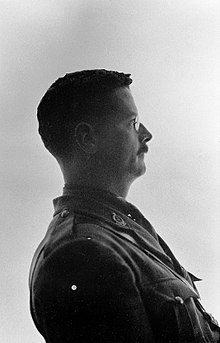Gordon Morgan Holmes
Sir Gordon Morgan Holmes , CMG , CBE (born February 22, 1876 in Dublin , † December 29, 1965 in Farnham ) was an Irish neurologist . He became known, among other things, because of the Stewart-Holmes syndrome, named after him and his colleague Thomas Grainger Stewart . See also Holmes Syndrome .
Life
Gordon Morgan Holmes was born to a successful farmer from Dellin House , Castlebellingham , County Louth (around 40 miles north of Dublin). The early death of his mother, Kathleen, née Morgan, and the remarriage of his father impaired Holmes' development and he became a loner , although he had three brothers and three sisters.
Despite his persistent dyslexia , he was an excellent student and after his teens studied medicine at Dundalk Academy's boarding school at Trinity College , Dublin. He graduated in 1897 at the age of 21.
Immediately afterwards he left his home and made the crossing to New Zealand possible as a ship's doctor . As a doctoral student in the field of neurology , he worked for two and a half years in Germany , first in Berlin and later in Frankfurt am Main at the Senckenberg Research Institute , together with Ludwig Edinger and Carl Weigert .
He later went back to London and became a doctor at the National Hospital for Neurology and Neurosurgery in Queen Square under John Hughlings Jackson , the most important British neurologist.
In 1906, Holmes was appointed director of clinical research at Queen Square, where he began his work with Henry Head in 1908, where the two complemented each other very well despite differences of opinion until the beginning of World War I.
Holmes felt again urge adventure and saw his place at the side of Captain Robert Falcon Scott at the South Pole - expedition , which was under bad stars. Due to an Achilles tendon rupture , he had to refrain from this plan and used the recovery time to achieve a higher medical degree. In 1910 he was a member of the College of the National Hospital when an elderly colleague died unexpectedly. From then on, his life revolved around his treatment and teaching activities in this hospital.
After the beginning of World War I, he became a consultant doctor to the British expeditionary forces , where he served in a field hospital with his neurosurgical colleague Percy Sargent . During his time in France he met his future wife Dr. Rosalie Jobson , an Oxford graduate and international athlete. She was the daughter of the later Brigadeartzes W. Jobson. With her he had three children together named Kathleen, Rosalie and Elizabeth.
Holmes's argument over gunshot wounds rekindled his interest in brain disorders.
When he returned to Charing Cross Hospital after the war was over, he was accompanied by William John Adie , a young Australian who later became a good friend of Holmes. Together they published several papers in 1941.
In the interwar period, Holmes had jobs in Queen Square, Moorfields Eye Hospital and Charing Cross Hospital.
Outside of medicine, Holmes was interested in Gothic church architecture, the geology of Ireland , gardens, and golf .
In 1936 Sir Gordon Holmes was elected a member of the Leopoldina . His academic treatises led to admission to the Royal Society and various honorary degrees, and for his contributions in the field of neurology he was awarded the knight bachelor's knighthood in 1951 . For his services in World War I, he received the Order of St. Michael and St. George and Order of the British Empire .
literature
- TG Stewart, G. Holmes Symptomatology of cerebellar tumors: A study of forty cases Brain, London, 1904, 27: 522-591.
- GM Holmes: A case of virilism associated with a suprarenal tumor: recovery after its removal quarterly. Journal of Medicine, Oxford, 1925, 18: 143-152.
- Henry Head , GM Holmes: Sensory disturbances from cerebral lesions Brain, Oxford, 1911, 34: 102-254.
- Henry Head, GM Holmes: First systematic account of the functions of the thalamus and its relationship to the cerebral cortex reprint for neurological studies, 1920.
- Henry Head, William Halse Rivers (1864–1922), G. Holmes, James Sherren, Harold Theodore Thompson (1878–1935), George Riddoch (1888–1947): Studies in Neurology (2 volumes), London, H. Frowde, Hodder & Stoughton, 1920.
- GM Holmes The Natural Hospital 1860-1948 Edinburgh & London, E & S Livingstone Ltd., 1954.
Individual evidence
- ^ Frank Clifford Rose: Sir Gordon Holmes (1876-1965) (English), in Twentieth Century Neurology , p. 89.
- ^ Member entry of Sir Gordon Holmes at the German Academy of Natural Scientists Leopoldina , accessed on November 14, 2016.
| personal data | |
|---|---|
| SURNAME | Holmes, Gordon Morgan |
| ALTERNATIVE NAMES | Holmes, GM |
| BRIEF DESCRIPTION | Irish neurologist |
| DATE OF BIRTH | February 22, 1876 |
| PLACE OF BIRTH | Dublin |
| DATE OF DEATH | December 29, 1965 |
| Place of death | Farnham |
